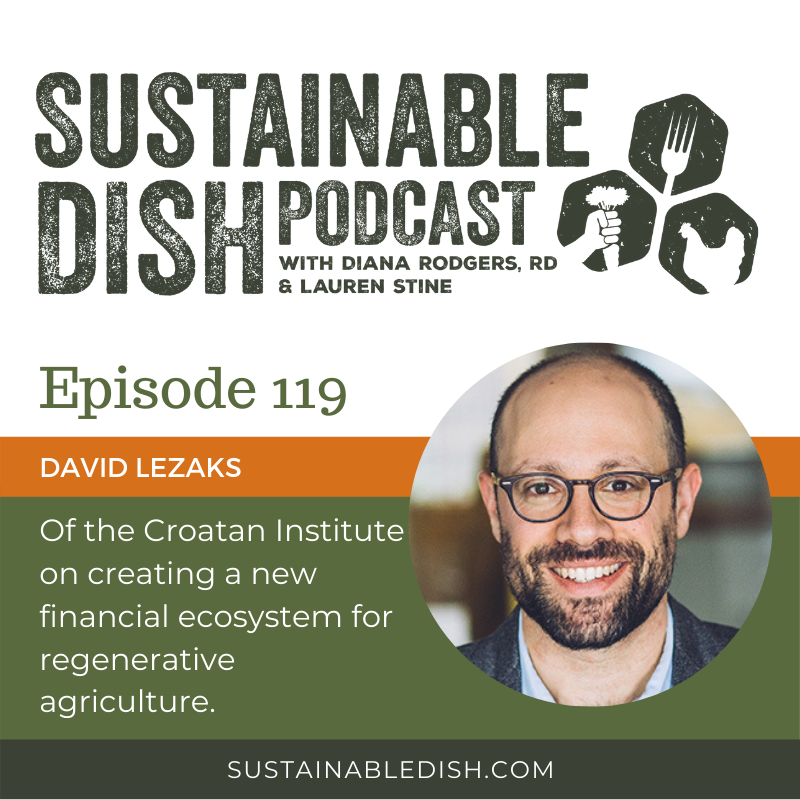Podcast (sustainable-dish-podcast): Play in new window | Download
Regenerative agriculture has a lot of promise when it comes to improving the way we grow food, rehabilitating our environment, and reconnecting consumers and agriculture. But there’s one piece of the equation that isn’t talked about as often: funding regenerative agriculture.
Asking farmers to adopt new practices sounds like a straightforward proposition but the upfront costs can be a non-starter for some farmers. Just the decision to adopt a cover cropping program on several thousands of acres of corn and soy can come with a hefty price tag in terms of purchasing the seed, new equipment like a no-till drill, and acquiring the educational savvy to do it all right. Cover cropping requires knowing what crops to plant, when to plant them, and when to terminate.
What makes this even more challenging is that many conventional banks and financial programs aren’t well equipped to understand regenerative agriculture. As a result, farmers often struggle to obtain financing to adopt new practices from traditional lenders. At the same time, farmers are some of the best risk managers out there, constantly reacting to unpredictable weather and uncertain future markets.
In this episode of the podcast, we talk with David LeZaks, a senior fellow at the Croatan Institute, about his work in regenerative agriculture finance. Croatan Institute is an independent, nonprofit research institute whose mission is to harness the power of investment for social good and ecological resilience by working at the critical nexus where sustainability, finance, and economic development intersect.
Fortunately, some investors are taking a more altruistic approach to how they invest their cash. Sometimes referred to as impact investment, more and more investors are only investing money where the project matches a specific set of goals or values like environmental rehabilitation or local food.
A new regenerative ag-dedicated venture capital investment firm called Soilworks recently launched and acquired grazing management software service PastureMap as its first investment, for example.
David talks about some of his recent work identifying barriers for small and medium-scale livestock producers due to Covid-19 in an effort to identify key pain points where investment is needed. He was also involved in producing the Soil Wealth report, which surveyed the landscape to identify existing investment vehicles for regenerative agriculture and opportunities to expand them.
This episode is brought to you by Blue Nest Beef. There’s a lot of choices for “better” beef out there and the folks at Blue Nest Beef are grassfed pioneers who’ve perfected all the steps it takes to make better beef even better. Not only is their beef delicious, but it comes exclusively from American ranchers who have been certified by the National Audubon Society as ranchers who are regenerating our land and bird habitats. If you’re looking for better beef, visit their website here and use the discount code “2BUYBLUENEST” for 15% off your first order!
Thanks, and enjoy the show!









1 thought on “Sustainable Dish Episode 119: David LeZaks”
This is a fascinating and inspiring episode and I love so much of what you are saying. I am concerned however, when I go over and check out Croatan I see that one of their partners is Burts Bees. This a company that was small and was bought out by Clorox who has thrown billions of dollars at the lobby to prevent the labeling of GMO products in our stores. It is a concerning partnership don’t you think? There may be others, this was just the one that jumped right out at me as I am most familiar with it. I don’t mean to detract from your message or what you are doing Diana, I think your movie and message are most needed in our world. Just a concern that crossed my mind as I ponder the reach of big, big business and its influence on even these socially and sustainability minded movements.